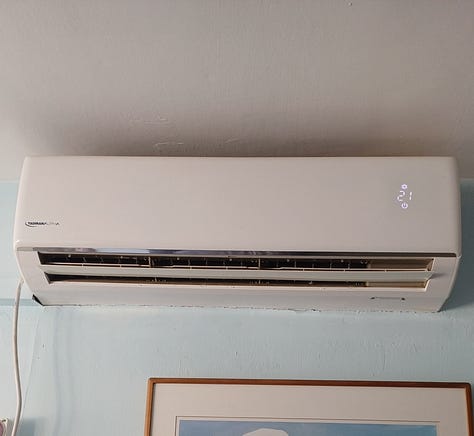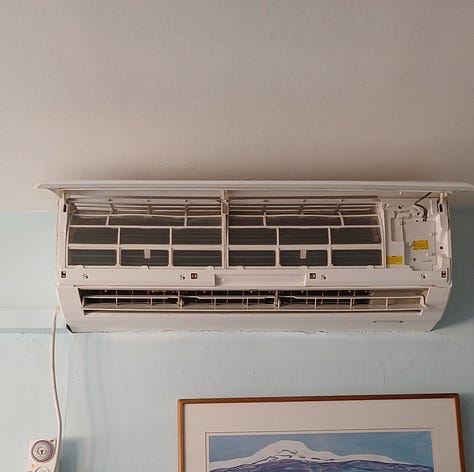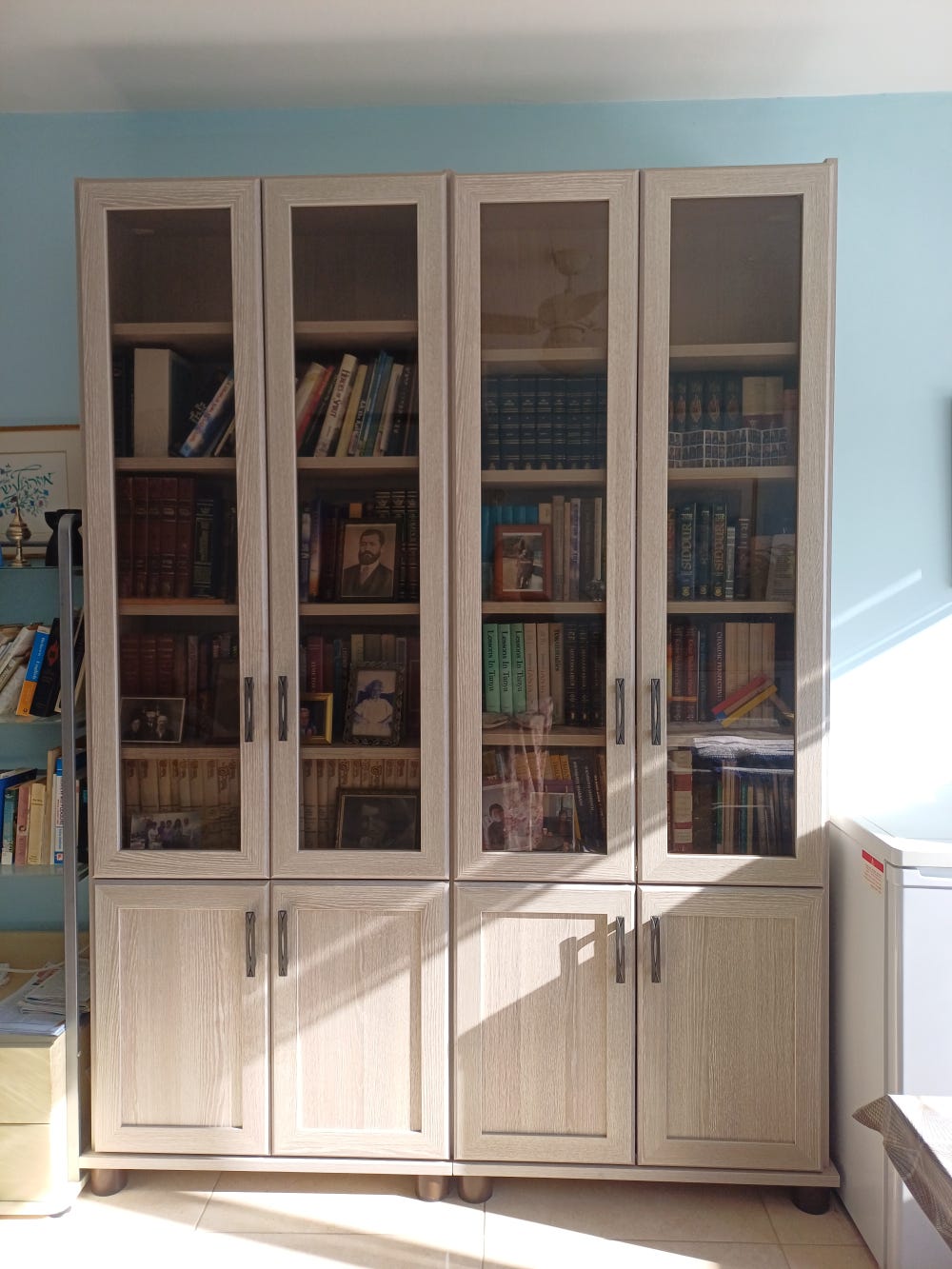Inspiration, Aspiration, and Functionality
Something light after all the heaviness of the past months
The other day I had this brief interaction on Facebook:
Original Poster (OP): What’s the most useful gadget, utensil, tool, appliance, or thing you acquired in 2024? Ours is this electric kettle, inspired by a home exchange stay in Palm Springs, CA in June. I came home and bought their exact model. Use it every day, maybe more than once. Inspire me with something else for 2025.
Me: It never occurred to me to get inspiration from a household appliance.
OP: 77 percent of life is functionality.
Now, I could be trendy and say “I’m a minimalist,” but if that term fits it is by chance, not by design. I attribute my lack of connection to OP’s idea to my many years of living on a limited budget so that “making do” is my way of life. Shopping, for me, is unpleasant. It is not a relaxing way to spend time. I am simply not interested enough in things to voluntarily spend time looking through them. (Museums, where there is something to learn from looking, are different, though I definitely prefer history museums, including natural history, to those dedicated to art.)
Lots of things in life, in my experience, do not function well enough to be written about, much less beloved, but they function well enough to get the job done. No fuss, no muss.
This concept extends beyond “things,” also known as “stuff.” An example: here in Israel, a predominantly desert country, we love rain. Complaining about it is almost blasphemous. It only rains in the winter, and in a good year it rains most of the winter. Even in the mountains where I live, few homes have central heating, the temperature often falls into the low 40’s F at night (that’s the upper single digits C), and the cement-construction apartments hold the cold and damp. Are rainy days fun times? Are they gorgeous, the way cloudless days with fresh snow are? How about coming home to a cozy home? No, no and no. Heat is very expensive, so we generally come home to chilly apartments, then turn on the heat (while wearing three or four layers). However, we appreciate the function of these cold, wet days because the appropriate amount of rain, no matter how uncomfortable, beats drought by a mile.
As the OP suggested, our lives depend on function, whether top-notch or not.
Okay then, next question: Is function related to inspiration?
Pondering
I have been thinking about this for over a week, and it has inspired me to think about my relationship to inspiration. Is inspiration connected to the things I use?
Me? I’m more likely to be inspired by the view from my window after I’ve used my kettle, made my tea, and am drinking it than by the kettle, cup or tea.


For me, the quality of something’s function is not particularly relevant. For the first five months after I moved to Israel, arriving mid-September, I didn’t have a washing machine or dryer. My town, like most others, does not have a laundromat. I did my laundry in the kitchen sink and hung it on a folding rack. But the heat in that apartment was terrible, so everything took four or five days to dry in the cold and damp. At last I bought a second-hand dryer. A while later I bought a washing machine, and when that dryer died, a new one. The appliances made my life easier, but more inspired? No.
For me and I think for many others, “stuff” is, if not a barrier to inspiration, at least not related. This, at least, is true for people who do not aspire to more stuff. I have seen stuff-loving people their creativity—the products of inspiration—when they stay in a job or career they don’t like because the paycheck permits them to buy more stuff than a job they’d like better. And those who work two jobs in order to pay off debt that they acquired by their accumulation of functionally fine products rarely have time to act on, or even think about, inspiration, except maybe the inspiration, as they pay their bills, to chuck it all and live in a yurt in Mongolia.
Insipiration versus Asperation
There’s a difference between inspiration and aspiration. Aspiration is the desire for something: to reach some level in one’s own mind, or in the imaginations of others. TAG Heur or Patek watches, for example, or driving a Lexus, are visible signs of status and the focus of aspiration for many. Loving products that function at the top level can also be aspiration to a level that prohibits creativity because of the demands of the cost of filling that aspiration. See above.
But inspiration? To me inspiration is related to creativity. The closest I come to inspiration after pondering functionality, the OP, and his post for several days, is the inspiration to write about inspiration, aspiration, and functionality.
Functionality
The most recent functional items to which I have aspired are bookcases.
Now, it may not come as a surprise to my readers that I have a fondness for books. The very first furniture I ordered when I moved to Israel was a large library cabinet. Of course, after my things from the USA arrived I needed more shelf space, both for books and for other things.
I moved into my present home a half-year before the Corona and soon found that the roof over the bathroom was not at all functional. It leaked so badly that on rainy days I didn’t need to climb into the shower to bathe, so I had to replace it immediately.1 I had not gotten around to furnishing the apartment when everything shut down for The Virus. I had moved in with just one bookcase, a tall white one with adjustable shelves, plus an ugly but very sturdy shelf unit that I had bought for the dysfunctional kitchen of my first apartment.
Having a more attractive office and a more functional sewing studio are both things to which I aspire. If I move the ugly unit to my sewing studio and get two that match the white one, both the attractiveness of my office and the functionality of my sewing studio will be increased.
During the Corona, when industries all over the world shut down, the bookcases became unavailable. Inspiration struck me a couple of months ago, and I started checking the website of the shop where I bought mine. At last they were back in stock, and I was inspired to finally improve my home’s functionality by ordering two more. Once I move the ugly one to the next room, they will just fill the rest of that wall beside the original one.
I aspired to own these bookcases, I was inspired to keep checking on their availability, and their functionality will improve my functional life. So I guess I should say that aspiration, inspiration, and functionality all melded in this purchase. P.S., they’re coming in two weeks, and my neighbor will assemble them. Hallelujah for good neighbors, without whom the functionality of the bookcases would remain unrealized as long as the boards remained in the cartons.
But where does this leave me in regard to the OP’s comment on appliances? Well, my inspiration does not lean towards acquisition, but to creativity. Aspiring to write an interesting post for this week, I’ve been inspired to draw parallels between the functionality of various household appliances and people.
Household Appliances and The Functionality of People
What kinds appliances are like people? Or what kind of people are like what appliances? Here are a few thoughts.
Vacuum cleaner: The vacuum cleaner uses a vacuum—the epitome of emptiness—to clean. It sucks everything around it into its own dirty container. It reminds me of those needy people who suck up all the energy in a room. They walk in like Eeyore, moaning about their lives, or alternatively trying so hard not to moan about their lives that they chatter endlessly about how good everything is, convincing no one except possibly themselves. One hates to think what the inside of their brain—their private thoughts—must be like, filled (like the vacuum canister) with all the ugliness it can suck up.
Stick blender: This is probably the kitchen appliance I use the most. It is extremely useful—but only in one context, chopping up small bits of food that are already in a liquid, or need a liquid, to create a product with a creamy texture. Try to chop up dry ingredients, and it does little if anything. I have had acquaintances like this: functioning in one context of my life only. There’s the one who loves to listen to tales of woe but doesn’t encourage positive behavior. There’s the gal who has nothing to share but gossip, and never learns that I don’t want to hear dirt about others. Some are great at giving advice, but terrible at living up to their own words. There’s even the mentor who is great with insight into work or craft issues but does not share her personal life and does not ask about mine. These relationships are one-dimensional. They serve a function, but don’t become real friends. Multi-functional people are the kind that we come to love.
Blow-dryer for hair: This serves an important function here in the winter, when cold, damp apartments mean hair does not dry quickly. But a blow-dryer has two big faults: it makes a lot of noise, and it can twist hair into terrible knots if not used properly. There are lots of folks like this. We even use the same metaphors: they blow a lot of hot air and can twist us into knots. Enough said.
Electric kettle (kumkum): The popular ones here heat by some mysterious force concentrated in the chupchik at the center of the base. (Chupchik is the Hebrew equivalent of “thingy”.)2 These are handy because they turn off automatically as soon as the water comes to a rolling boil, so the water doesn’t boil away. Having boiled out the base of one kettle is, I suspect, the primary reason people keep buying those annoying whistling ones.
According to Professor Google, a kumkum should last four or five years. I have been here seven-plus years and am on my fourth kumkum. I have had two made out of stainless steel, one plastic, and now glass. The first stainless one I got for only 10 shekels as a pre-Passover promotion at the hardware store. It died after about six months. I shouldn’t have been surprised. I don’t recall why the second one died, it might have been knocked onto the stone floor by Moka. She’s the most curious of all the cats I have owned, and her curiosity apparently extends to wondering what will happen if something falls.
The plastic one died my second year here, or more properly it was murdered. I was sick and stumbled into the kitchen to make myself a cup of tea. In a semi-conscious state, I put the plastic kettle on the gas instead of on its heating base. Yeah. That burner was fun to clean. If I die of some strange disease, it will be from inhaling that melted plastic.
So, back to the kind of people are like electric kumkums. Some people’s friendship burns hot and bright, but only for a short time. Often these people want something and disappear when they get it or when they realize it isn’t coming. One would be the young women who would become BFFs3 of another woman until she had stolen that woman’s love interest. Back then, we called them barracudas, although I can think, in context of this paragraph, of a term that might be more appropriate.
The Mazgan: This heater-air conditioner-fan-dehumidifier may be the most popular HVAC product in northern Israel. It could also be a metaphor for one’s “significant other.” Controlled by a remote (in itself, sometimes a metaphor for a spouse), it provides many functions. It can be set to run automatically on Shabbat and holidays. It needs regular maintenance such as cleaning the filters (especially if one has a fluffy cat), as well as professional assistance from time to time to clean and recharge the cooling function, and it runs hot and cold. If you don’t see the parallels to your main relationship, either you are blind, your relationship is totally different from mine, or both. In short, though, when it works properly it is a tremendous help and comfort. When not, not.



Conclusion
Well, there you have it: the 77% functionality and inspiration from appliances, plus a dab of creativity. I don’t think this is what the OP I quoted at the start of this meant. Although appliances don’t inspire me, our little exchange about them did.
The bathroom had been added a few years earlier; its roof is separate from the roof over the rest of the apartment. The rest of the roof only started to leak this year and will be replaced as soon as winter is over. I didn’t want to replace it during the height of the war with Hezbollah; there was no reason to put some 20,000 shekels into a roof that could have been damaged by a rocket at any time.
For more on kumkums, and to read what inspired these particular paragraphs, check out the blog Treppenwitz, whose May 13, 2007 essay brightened a cloudy day.
BFF stands for “best friend forever.”





Fun and inspirational at the same time!
Hi Hannah,
As usual I enjoyed this fanciful and very interested in your essay! It reminds me of how much we take for granted here in the US and complain of the prices but we buy them anyway. Certainly we are spoiled here! Let's pray this "ceasefire" plan works but I still cannot fully put my trust in the enemy. Biden is taking all the credit for the ceasefire; he is so far out of reality and thankful his administration is over. I do hear Netanyahu has been under a lot of pressure to end this war. Love hearing from you, as always! Love and hope for Israel and you! Martie